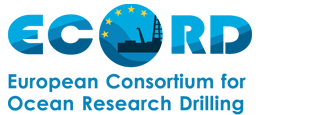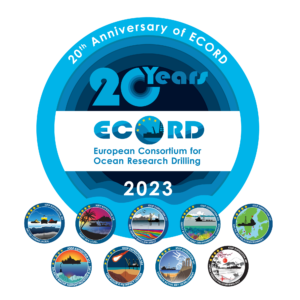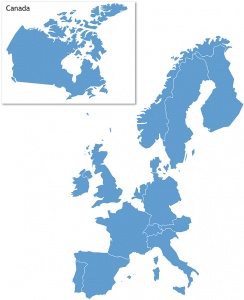 ECORD, the European Consortium for Ocean Research Drilling, is a management structure of 15 members (14 European countries and Canada) for scientific ocean drilling as part of the International Ocean Discovery Program (IODP) “Exploring the Earth under the sea” and previously the Integrated Ocean Drilling Program – IODP from 2003 to 2013.
ECORD, the European Consortium for Ocean Research Drilling, is a management structure of 15 members (14 European countries and Canada) for scientific ocean drilling as part of the International Ocean Discovery Program (IODP) “Exploring the Earth under the sea” and previously the Integrated Ocean Drilling Program – IODP from 2003 to 2013.
The science in IODP involves a wide range of fundamental and applied issues for society, such as climate and ocean change, biodiversity and origin of life, the Earth in motion including the study of earthquakes processes, and the Earth structure and dynamics in relation with its surface environment.
>> IODP Science Plan for 2013-2023 “Illuminating Earth’s Past, Present and Future”.
Three Platform Providers conduct IODP expeditions: the U.S.A. and Japan operate deep-sea drillships, JOIDES Resolution and Chikyu respectively. ECORD is responsible for funding and implementing mission-specific platform (MSP) expeditions. To date, eight IODP MSP expeditions – Arctic Coring-ACEX (2004), Tahiti Sea Level (2005), New Jersey Shallow Shelf (2009), Great Barrier Reef Environmental Changes (2010), Baltic Sea Paleoenvironment (2013), Atlantis Massif Serpentinization and Life (2015), Chicxulub K-Pg Impact Crater (2016) and Corinth Active Rift Development (2017) – have been carried out in areas inaccessible to the JOIDES Resolution and Chikyu.
As part of the International Ocean Discovery Program, ECORD focuses on:
- ECORD membership: the ECORD Memorandum of Understanding (MoU) is signed by all ECORD members;
- Delivering an average of one MSP expedition per year;
- Signing the ECORD-NSF MoU, which defines the ECORD financial contribution to the JOIDES Resolution and the number of ECORD scientists to sail on each JR expedition;
- Signing the ECORD-JAMSTEC MoU, which defines the ECORD financial contribution to the funding of the Chikyu and the number of ECORD scientists to sail on each Chikyu expedition;
- Establishing a European Infrastructure;
- Defining in-kind contributions for mission-specific platform expeditions.
The following organisations/countries are the funding agencies of ECORD and have been elected to be members of ECORD. Membership is defined by a Memorandum of Understanding between each member country and ECORD. Each member of ECORD is represented by one delegate sitting on the ECORD Council.
Austria
Österreichische Akademie der Wissenschaften – ÖAW Postgasse 7-9, 1010 Wien, Austria
Canada
Canadian Consortium for Ocean Drilling – CCOD Department of Earth Sciences, Memorial University, St. Johns, Newfoundland, A1B 3X5 Canada
Denmark
Danish Agency for Science and Higher Education – DAFSHE Bredgade 40, 1260 Copenhagen, Denmark
Finland
Academy of Finland Hakaniemenrenta 6, PO Box 131, 005031 Helsinki, Finland
France
Centre National de la Recherche Scientifique – CNRS 3, rue Michel-Ange, 75766 Paris CEDEX 16, France
Germany
Deutsche Forschungsgemeinschaft – DFG Kennedyallee 40, 53175 Bonn, Germany
Ireland
Geological Survey of Ireland – GSI Beggars Bush, Haddington Rd, Dublin 4, Ireland
Italy
Consiglio Nazionale delle Ricerche – CNR Dipartimento Scienze del Sistema Terra e Tecnologie per l’Ambiente (DTA), Piazzale Aldo Moro 7, 00185 Roma, Italy
The Netherlands
Dutch Research Council – NWO Laan van Nieuw Oost Indië 300, 2593 CE Den Haag, The Netherlands
Norway
Research Council of Norway – Forskningsradet PO Box 564, 1327 Lysaker, Norway
Portugal
Fundação para a Ciência e a Tecnologia – FCT Av. D. Carlos I, 126, 1249-074 Lisboa, Portugal
Spain
Ministerio de Ciencia e Innovación – MCIN Paseo de la Castellana, 162, 28046 Madrid, Spain
Sweden
Swedish Research Council – VR Västra Järnvägsgatan 3, Box 1035, 10138 Stockholm, Sweden
Switzerland
Fonds National Suisse de la Recherche Scientifique – FNS Wildhainweg 3, 3001 Bern, Switzerland
The United Kingdom
UK Research and Innovation – UKRI Polaris House, North Star Avenue, Swindon SN2 1FL, UK
Making ECORD an effective part of International Ocean Discovery Program (IODP) has meant a new organisation was created to undertake all ECORD activities. ECORD’s role is to coordinate European and Canadian participation in IODP and to extend the scientific capability of the programme by providing support for mission-specific platform (MSP) operations.
As defined in the ECORD MoU, ECORD is structured into five entities, two Task Forces and one Ad-hoc Committee: 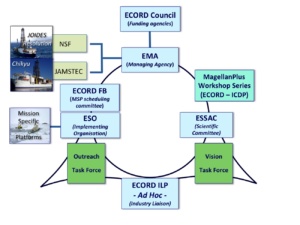
- ECORD Council
- ECORD Facility Board (EFB), the key planning forum for MSP operations, was initiated in Fall 2012. It is composed of a Science Board (six leading scientists), the Executive Bureau (Executive Council Members, EMA Director and Chairs of ESO, ESSAC and ECORD-ILP), and representatives of ESO and IODP entities.
- ECORD Managing Agency (EMA)
- ECORD Science Operator (ESO)
- ECORD Science and Support Advisory Committee (ESSAC)
- Outreach Task Force (OTF) coordinates ECORD communication (public information, media and press) and education. The OTF is composed of the ECORD Outreach Team, the EMA Director and Assistant Director and the ESSAC Chair.
- Vision Task Force (VTF) identifies strategic developments (new members, funding, etc.) and monitors ECORD science and techology progresses. The VTF is composed of the ESSAC Chair as TF Chair, EMA Director and Assistant Director, ESO Chair and Outreach Manager and ECORD ILP Chair.
- ECORD Industry Liaison Panel (ECORD ILP) – Ad-hoc Committee.
The International Ocean Discovery Program (IODP), Exploring the Earth beneath the Sea, is an international research programme for scientific oceanic drilling supported by 23 countries. The programme was launched in October 2013 and currently joins the USA, ECORD, Japan, China, South Korea, India, Brazil, Australia and New Zealand.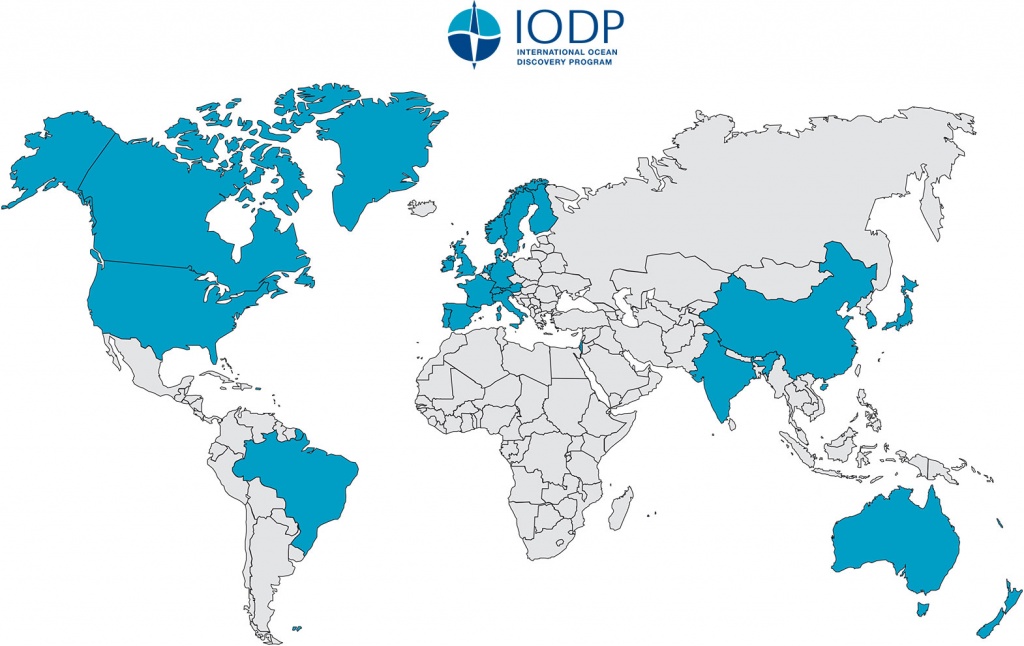
IODP SCIENCE PLAN
The IODP Science Plan for 2013-2023 “Illuminating Earth’s Past, Present and Future”, published in June 2011, addresses high scientific priorities and societal relevance within four themes:
- Climate and Ocean Change – Reading the past and informing the future
- Biosphere Frontiers – Deep life, biodiversity and environmental forcing of ecosytems
- Earth Connections – Deep processes and their impacts on Earth’s surface environment
- Earth in Motion – Processes and hazards on human time scales
IODP STRUCTURE
The architecture of the programme is composed of the following entities:
- IODP Forum is the overarching umbrella of the programme,
- Science Support Office assists the IODP boards and panels, manages the submission/review system for IODP proposals along with the Site Survey Data Bank and the IODP website,
- 2 IODP advisory panels / 3 Facility Boards for evaluation of the IODP proposals and programming/scheduling of expeditions for all IODP platforms,
- 3 Platform Providers operate IODP expeditions and are in charge with related data management, core curation, publications, engineering development and education and outreach. Each Platform Provider will rely on its own Facility Board to schedule their platforms (JOIDES Resolution, Chikyu and MSPs) based on the proposals forwarded by the IODP advisory panels.
FUNDING IODP
Annual funding is provided by:
Current Actions
ESFRI
ESFRI, the European Strategy Forum on Research Infrastructures, is a strategic instrument to develop the scientific integration of Europe and to strengthen its international outreach. The main scope of ESFRI is to support a coherent and strategy-led approach to policy-making on Research Infrastructures (RI) in Europe and to facilitate multilateral initiatives leading to the better use and development of RIs.
Earth Science Europe (ESE)
Since 2012, ECORD participates in the Earth Science Europe initiative – http://www.earthscienceeurope.org – which aims at establishing an Earth Science Forum or Board recognised by both the Earth Science community and the European Commission.
Past Actions
ECORD as an ERIC
In 2013, ECORD has started to explore a new way of organising its management and funding as a European Research Infrastructre Consortium (ERIC). A working group involving ECORD representatives and EC experts has been set up and reports to the ECORD Council on a regular basis.
DEDI: a proposal in the frame of the EC Integrated Infrastructure Inititative
A proposal coordinated by the BGS and based on the DEISM and DEDI pre-proposals was submitted in September 2014 in the frame of the EC H2020 INFRAIA – 2014- 2015. Unfortunately the proposal has been rejected.
DEISM: Distributed European Infrastructure for Subseafloor Sampling and Monitoring – DEDI: Distributed European Drilling Infrastructure
DEDI-2
A DEDI-2 (Distributed European Drilling Infrastructure) pre-proposal was submitted in March 2016 in the frame of Horizon 2020 (H2020-INFRAIA), with Achim Kopf (MARUM, Bremen, Germany) as lead proponent. A full proposal was submitted in March 2017. There are 23 participants from 15 countries and eight key partners (MARUM, BGS, University of Leicester, University of Montpellier, GFZ, CEREGE, University of Lund and the OGS-Trieste), including five ECORD key stakeholders.
DEDI will…
- … foster cooperation between existing research infrastructures and link scientific communities, industries and other stakeholders;
- … foster cooperation between existing research infrastructures and link scientific communities, industries and other stakeholders;
- … bring the different drilling communities close together;
- … support transnational access to cutting edge technologies and proven scientific services. An inventory of existing technologies (drilling, logging, etc.) can be provided;
- … improve existing technologies and create innovative new tools;
- … foster synergies and pool resources in scientific drilling and monitoring for transnational use;
- … establish an effective knowledge exchange and design training classes;
- … help develop a sustainable sample and data curation management plan.
A roadmap within the European landscape of research infrastructures can be established. The efficient use of DEDI can be demonstrated through the implementation of the first amphibious drilling proposal: the Nice Landslide proposal (ADP #796).
Deep Sea & Sub-Seafloor Frontier (DS3F) (2010-2012)
In continuation of DSF, a Coordination Action entitled “Deep Sea and Sub-Seafloor Frontier (DS3F)” was funded by the EC (FP7) and launched in January 2010. ECORD led the WP7 entitled “Mission subseafloor sampling”. The DS3F White Paper was published in 2012.
Deep-Sea Frontier Initiative (2006-2010)
The DSF Initiative was launched in 2006 and supported by ECORD-Net. A foresight document entitled “The Deep-Sea Frontier: science challenges for a sustainable future” was published in 2007 by the EC (FP7).
ECORD-Net (2003-2008)
Soon after its launch in December 2003, ECORD was supported by an ERA-Net Coordinated Action (FP6), named ECORD-Net, to help set up the consortium. The project included 8 work-packages, 11 partners and was funded for 57 months >> ECORD-Net Final Report.
JEODI (2001-2003)
In September 2001, the EC-funded Thematic Network Joint European Ocean Drilling Initiative (JEODI) provided the basis for a distinct European operational component to the Integrated Ocean Drilling Program (IODP). The European Consortium for Ocean Research Drilling (ECORD) was launched in December 2003 and officially joined IODP in March 2004.
Europe as part of scientific ocean drilling programmes (1968-2001)
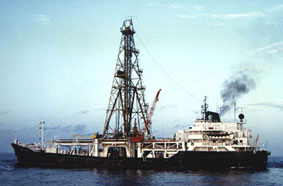
Glomar Challenger 1969-1983
From 1968 and the verification of the plate tectonics hypothesis, the Deep Sea Drilling Project (DSDP) and, later on 1985, the Ocean Drilling Program (ODP) have undertaken an unprecedented programme of international scientfic research in Earth Sciences. From 1969 until 2003, the field work and the post-cruise science research were organised around the activity of a single deep-ocean drilling ship, the Glomar Challenger for DSDP and the JOIDES Resolution for ODP.
Since the start of the International Phase of Ocean Drilling (IPOD) in 1975 when Germany, the United Kingdom and France joined USA, Japan and USSR, European scientists contributed significantly to both programmes.
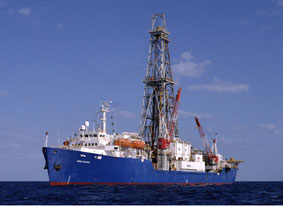
JOIDES Resolution 1985-2005
From JEODI to ECORD (2001-2003)
In September 2001, the EC-funded Thematic Network Joint European Ocean Drilling Initiative (JEODI), which provided the basis for a distinct European operational component to the Integrated Ocean Drilling Program (IODP), was launched. One of the main JEODI‘s objectives was to ensure that Europe’s voice is united in the new scientific ocean drilling programme. Furthermore, JEODI also defined how to implement mission-specific platform expeditions with shipboard and onshore laboratories, borehole geophysics and logging and education/outreach programme for the European part of scientific ocean drilling within IODP.
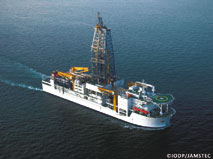
Chikyu from 2005
Although in ODP twelve smaller European nations had teamed up under a single consortium, Europe basically acted as a set of four individual members. For participation in IODP, the European countries signed a Memorandum of Understanding (MoU) to join as a single consortium named the European Consortium for Ocean Research Drilling (ECORD). In a way much different from the past years, Europe then not only benefits from a worldwide infrastructure, but also plays a major role in defining the science of the programme and in developing its technological know-how. As such, ECORD becomes a significant partner in IODP by providing the third leg to the programme with a set of mission-specific platforms.
ECORD and IODP (2003-2013)
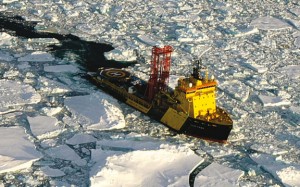
I/B Vidar Viking: Arctic 2004
In October 2003, the scientific ocean drilling entered a new era of sampling/monitoring the ocean floor with the development of a multiple platform programme based on the Initial Science Plan for the IODP, Earth, Oceans and Life (ISP). The USA and Japan recognised this need and joined the Integrated Ocean Drilling Program (IODP) – involving two ocean-going vessels, a deep-sea drilling vessel, equipped with riser technology, named Chikyu owned and operated by Japan (CDEX), and a multi-tasking vessel, JOIDES Resolution, equipped and operated by the USA (USIO).
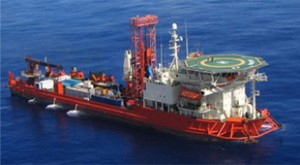
DP Hunter: Tahiti 2005
However, the two deep-sea drilling vessels are unable to achieve all objectives of the ISP, particularly in shallow water environments and in ice-covered regions. Both environments are key locations to key to study past climate changes – sediments deposited in the shallow seas and continental margins control the carbon cycle on Earth, and the Arctic is the thermostat controling the Earth’s ocean currents, but its deep seafloor, which contains the archives of ancient ocean evolution, remained totally unknown. These realms were sampled with mission-specific platforms (MSPs) implemented on a case-by-case basis by ECORD such as I/B Vidar Viking, DP Hunter, L/B Kayd, Greatship Maya and Greatship Manisha.
Such a common approach initiated by the European funding agencies forming the European Consortium for Ocean Research Drilling – ECORD was supported by the European Commission as an ERA-Net Coordinated Action (FP6), named ECORD-Net from 2003 to 2008.

JOIDES Resolution from 2009
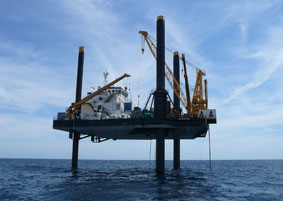
L/B Kayd: New Jersey 2009
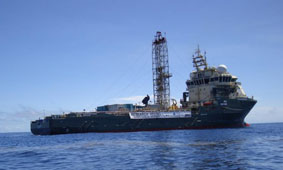
Greatship Maya: Great Barrier Reef 2010
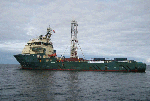
Greatship Manisha: Baltic Sea 2013
